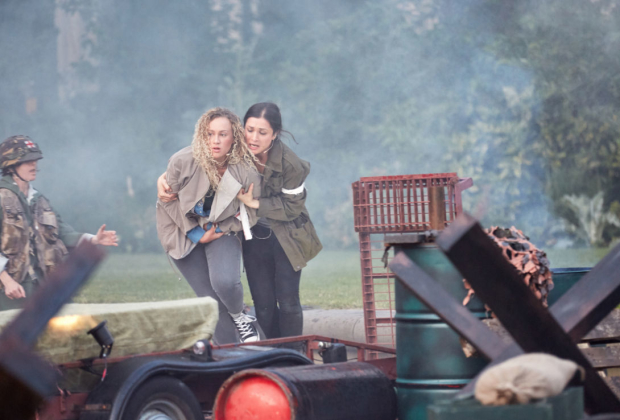Camelot: The Shining City (Sheffield Crucible)

© Mark Douet
Smoke grenades arch overhead. Watery explosions burst into the air. Someone stands up and rat-a-tat-tats a machine gun into the crowd and a huge ball of fire engulfs three actors right in the middle of Tudor Square. Welcome to the gun show. Welcome to Sheffield.
Camelot: The Shining City is a contemporary retelling of Arthurian legend as a kind of English Spring. Its Arthur is Bear (Tia Bannon) – a mixed race local lass, daughter of an army general, who learns how to fight and leads a popular revolution. On the throne ten years later, though, she turns her army on her own people and, as her knights lead a counter-revolt, the country plunges into a bitter civil war.
Slung Low's latest city-sized spectacular deploys a cast of 127, all drawn from the local community, as protestors, armed police and soldiers. There are land rovers and riot shields, flaming swords and sub-machine guns. It's empowering stuff – a popular uprising played out by the people – but it also feels like a crowd-sourced tattoo, right down to the unsavoury undertone of jingoism.
‘Camelot‘s politics are muddied and muddled and sometimes flat-out disquieting'
Because it's one thing to watch a mock military display, to smile as swords clang and stage punches land. It's quite another to march through Sheffield waving St George's Crosses and cheering knights dressed like Crusaders as they head off to fight ISIS.

James Phillips and Alan Lane, writer and director, must want us to check what we're cheering, but they never quite make us do so. Camelot asks us to be wary of leaders – Bear turns against her people, Galahad (Sam Guest) turns jihadist – but it's not in control of either its symbols or its story. With a community show, when you're asking real people to represent something, you absolutely have to be.
There's an awful lot to love here – not least the ambition, the swagger and the community involvement. People of all ages and races, shapes and sizes get to run through Sheffield like they're action heroes. They stage fight and sword-wield and lob grenades – and, moreover, they're trusted to do so.
But Camelot's politics are muddied and muddled and sometimes flat-out disquieting: grass-roots politics and multiculturalism yes, but also England-til-I-die and very definitely Christian. The complexity's admirable – not least the desire to avoid goodies and baddies – but that leaves our adrenaline with no place to go and no obvious side to root for; and, for all its cinematic bombast, I can't help but wonder whether all this arms-toting, flame-throwing, dick-swinging stuff is really the sort of participatory theatre we should be gunning for.
Camelot: The Shining City runs at the Sheffield Crucible until 18 July 2015










